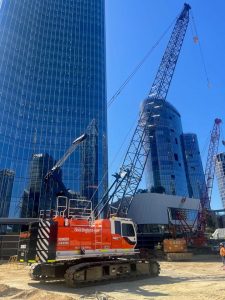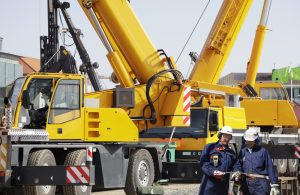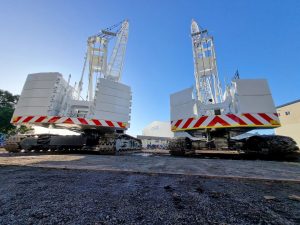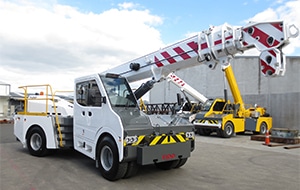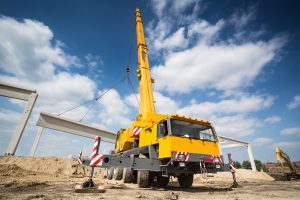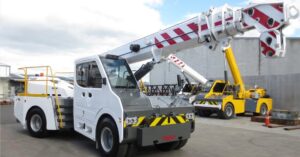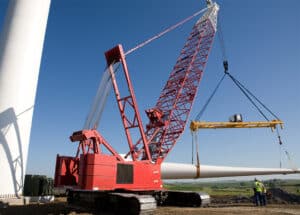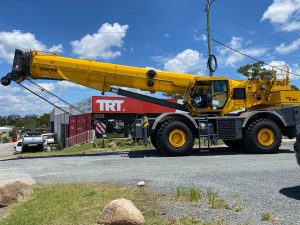New Groves Introduced To McKay United
Grove has long been one of the go to solutions for companies seeking heavy equipment for all weighted lifts. Victorian based cranes company Mckay United has acquired some of their newer models including a 250t class GMK5250L and the 400t GMK 6400.

Grove has long been one of the go to solutions for companies seeking heavy equipment for all weighted lifts. Victorian based cranes company Mckay United has acquired some of their newer models including a 250t class GMK5250L and the 400t GMK 6400.
The heritage of Mckay United dates back to 1987 when Gilbert McKay founded Williamstown Crane Hire in the western suburbs of Melbourne. Managing director, Tom Smith, joined the organisation in 2001.
“We were the typical suburban crane company. We were very much a supplier to the manufacturing and industrial sectors in Melbourne, which were predominantly situated on the western side of the city. Clients included the ports, factories and petrochemical companies.
“Whether it was the motor industry or the big chemical players, over time and as a result of international competition these companies moved on and the factories have gone. We still supply some of the Tier One industrial sectors on that side of town, but we needed to expand and get into other markets because our traditional client base was naturally declining,” Smith said.
Williamstown acquired Geelong-based, Eastside Crane Hire in 2007, and in 2010 it had some surplus equipment that was moved to Hobart.
Related stories:
- Grove launches GMK6400-1 at CONEXPO
- Three new Grove cranes revealed at bauma 2019
- Manitowoc continues Grove legacy
According to Smith, previously there was an old company called Elliott’s Crane Hire, which had decided to exit the crane hire market after the global financial crisis. McKay United jumped in with one of their employees and continued on with that business utilising some of their excess equipment from the Melbourne operation.
“Today, we have three depots, Melbourne, Geelong and Hobart and four or five years ago, we rebranded the businesses McKay United to enable us to trade under the one parent company. The name McKay United came from the original founder and also the uniting of the three entities,” he said.
McKay United’s customer profile is orientated towards Tier One companies across all industry sectors, said Smith.
“Whichever industry sector we are in, we target Tier One organisations. Exxon Mobil is an example of a Tier One petrochemical company that we supply to and we also supply to Tier One ports and services companies and Tier One civil construction company such as Lend Lease. Whether it be in construction, industrial, ports, petrochemical, or whatever industry it is, we resonate towards those blue-chip customers.
“We really don’t have a lot of customers at the smaller end. Put plainly and simply, you can’t put in place the health and safety regimes you need to supply Tier One businesses and then drive out of the yard tomorrow and supply a builder who wants you to do pretty much anything,” Smith said.
The Grove 450t is the largest hydraulic mobile in the McKay fleet along with Demag 350t Super Lift crawlers, which are all based in Melbourne. There’s a step down in capacity to the smaller city cranes including the 13t Kato, which is their smallest machine in Melbourne. Then there are all terrains and Frannas in between. McKay is running approximately 30 cranes out of Melbourne, another eight from Geelong and 12 out of Hobart. The largest crane in the Hobart fleet is a 220t hydraulic mobile and then a full range down to a 12t city crane.
Smith explains the ups and downs of the long-standing relationship with Grove.The relationship with Grove started back in 2000 when they took delivery of the first Australasian GMK5100, Grove’s five axle 100t all-terrain which had a very strong lifting chart, Smith describes it as almost like a 120t machine at some points on the chart. They put that into their fleet in 2000 and followed it with a GMK4075. Both of those cranes are still in the Hobart fleet.

“We then took delivery of a new 200t machine in 2005 and at the same time we took a second-hand crane out of Germany, which was the same model crane, so at the time we were predominantly a Grove company, and this was the case up until around 2007/2008,” he said.
After the GFC, Grove changed direction in terms of service and support, which went on for a while, but according to Smith the relationship got back on track with a renewed focus on product support in Victoria, and McKay United started to renew its fleet again.
“Our relationship was really reinvigorated when we purchased a five-year-old, 450t mobile from General Cranes in Victoria two years ago. This purchase put us back in touch with Grove in terms of looking for support and at that time they changed their approach to maintenance in Victoria. They added local people to their team, who we knew, and who were already servicing, our cranes,” he said.
“We felt more comfortable about product back up and support, which gave us confidence. We then had some good product feedback on the 250t class crane, the GMK5250L, which we took delivery of last February and then in August we took delivery of the GMK 6400, which is the 400t hydraulic mobile. At the moment, across our fleet, we run the 450t, the 400t, 250t two 200t, a 100t, a 75t and a 55t. We’ve also got a 100t Manitowoc crawler crane and we’ve just ordered a GMK5250XL, which is the 78.5m live boom machine,” Smith said.
According to John Stewart, vice president and GM, Manitowoc Cranes ANZ, the relationship with McKay United dates back 20 years.
“I was involved with the sale of the first GMK5100 way back in 2000. It is great to see the growth and expansion of customers over the years and to watch our products make their contribution. All relationships go through their ups and downs, so it’s especially satisfying to regain our relationship with Tom and the Mckay United team and to know the first crane is still making them money after 20 years in the field,” he said.
According to Smith, the relationship is right back on track.
“Now, we’ve got good communication with the Grove representatives, especially Andrew Gray. They now use JDM Diesel Services in Victoria for the servicing and we get good service from John Mahoney and his team. The reliability on the new machines has meant we haven’t required continuous support, which is obviously a good thing with the older machines, we’ve learned how to deal with them in house. However, when you commit to new products and new release machines, you’re not completely sure how they are going to perform and you need to feel confident that if you need to contact somebody you are going to get a result. Over the last two years, we’ve renewed and modernised our Grove fleet and we’ve had a really good result with the machines and also the back up and support,” he said.
Andrew Gray, sales manager Manitowoc Cranes, had this to say about Smith and his team.
“Tom and his team are great to deal with, very professional and very thoughtful about what they do. They know their business and understand the demands their customers face. Every crane in the fleet has been carefully selected to suit particular applications and industry sectors. It is testament to their service and maintenance program that some of their earliest purchases are operating perfectly in the fleet, 20 years later,” said Gray.
McKay United will buy the best machines for the company’s service mix and it’s important to have some diversity in the fleet said Smith.
“The different manufacturers are pitching in slightly different areas. For example, the equivalent 250t in other brands is a stronger machine down low, in a shorter boom configuration for heavy lifting, but the Grove is a stronger machine on the fly and up high. Different brands offer different options and solutions.
“We have customers requiring wind farm maintenance and the Grove is a better option for this type of application. When we’re lifting structural beams for example, other brands are a better option. Future additions to the fleet are dependent on what markets we’re trying to push into next. Currently, we feel we have enough infrastructure machinery and some of the Grove options we have now suit where we want to go to next,” he said.
According to Smith, both the Victorian and Tasmanian markets are busy with healthy pipelines of work.
“In Victoria, in the third quarter, January through to March 2020, will probably be our biggest quarter three in our history and this quarter normally comes with bit of a Christmas hangover. This year we were back to work on January 6th for construction work and we go through a rail occupation in February, plus we’ve got plenty of allied type works running alongside it. The rest of the year looks very strong as well,” he said.
“We run a 60-40 split on our revenue streams with 60 per cent on industrial and ports and 40 per cent on construction. Our crews are different for both sides of the business. The health and safety systems and productivity expectations are different in each area, which makes it very difficult to cross the crews over. We try and run specialised crews on the heavy hydraulics and crawler cranes which are mainly in construction and we’ve got a core group operating in in the petrochemical and ports division,” said Smith.
The ageing demographic is also an industry-wide issue and according to Smith, McKay United is no different in terms of needing to address the issue.
“We’ve got a trainee who is 12 months in, and we started a new trainee in February, and he is part of the second Victorian wave. Victoria’s traineeship options have just gone into its second round and he’s a candidate from this. Everyone is struggling with the ageing workforce issue.
“As the client base and some of the technology has evolved, whether it’s something as basic as introducing IT products or the need for better interaction with the men on site through technology, some of the older crews have found it difficult to adapt compared to the younger guys. It’s the same with the software in the new cranes. We see the younger guys taking to it much quicker than the older ones,” he said.
Smith said that trying to get quality people through to replace or replenish the work force is usually hard. However, companies like McKay United that supply to major projects are running fairly long workdays, which deliver good wages to their crews.
“Consequently, we will often find an operator with a suburban crane company keen to shift into this project work, so we don’t really have difficulty attracting workers to the business during this time. That may be good for our business, but that’s not really helping the available pool of labour is it?” said Smith.
If you would like to read the full article head on over to the Cranes and Lifting website.
